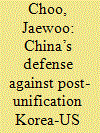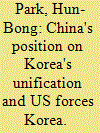| Srl | Item |
| 1 |
ID:
147372


|
|
|
|
|
| Summary/Abstract |
China has long upheld a neutral, if not opposing, stance to Korean unification, a stance which could be largely defined as the political risks associated with the Republic of Korea (ROK)-US alliance and the stationing of US forces (USFK) in South Korea. Given South Korea’s need to engage USFK forces, does it imply there would not be a complete resolution to the Korean conundrum and to the future status of the US-ROK alliance and the USFK forces? In the recent years, the Chinese has somewhat softened its stance and its support of South Korea’s unification initiatives can be seen coming from the party, the military, and the political realm. Empirical evidence and logical inference from recent Chinese intellectual discourse have indicated that China’s security concerns could possibly be allayed if there is a redefinition of the ROK-US alliance and the USFK in the context of defending Taiwan and if the Korean unification precedes China’s.
|
|
|
|
|
|
|
|
|
|
|
|
|
|
|
|
| 2 |
ID:
098763


|
|
|
| 3 |
ID:
163785


|
|
|
|
|
| Summary/Abstract |
On April 27, 2018, at the third two Koreas summit in South Korea, the president of
South Korea Moon Jae-in and the chairman Kim Jong Un promised to open a new
path of peace. The two Koreas seemed to successfully handle problems between
them. However, based on the previous behaviors of North Korea, we should not
be too optimistic. The reason why I write this paper in this peaceful mood is
that paying attention to national security is always worthwhile. Many scholars
have found several reasons for North Korea’s provocations against South Korea.
However, there is a lack of empirical support regarding them. I try to test and find
the reasons for North Korea’s provocations. I use multivariate regression and Prais–
Winsten regression to test my hypotheses. Domestic stability and power succession
have statistically significant relationships with the number of provocations, but the
results are quite mixed.
|
|
|
|
|
|
|
|
|
|
|
|
|
|
|
|